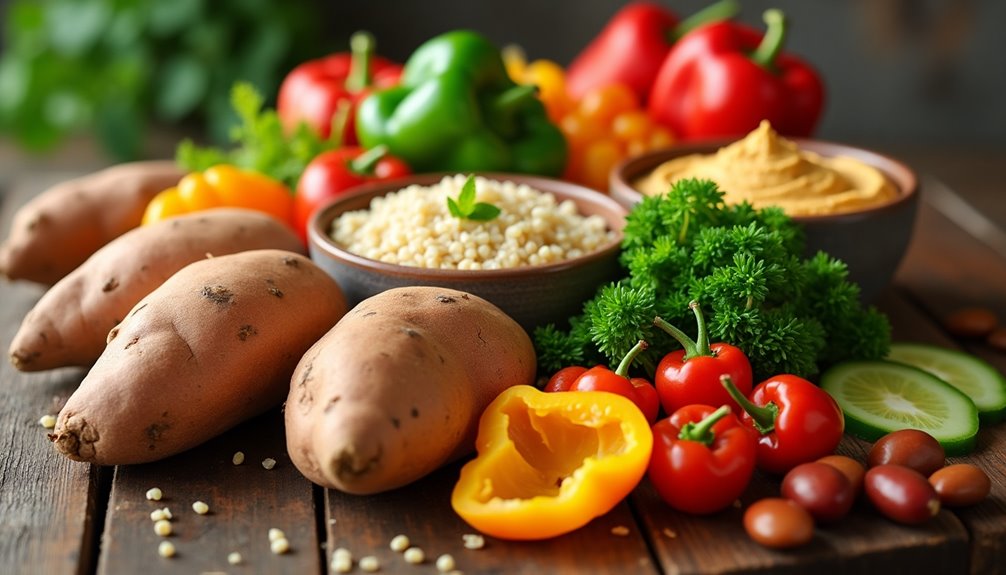The Starch Solution Diet focuses on a plant-based lifestyle, emphasizing starchy foods like whole grains, legumes, vegetables, and fruits. This approach supports weight loss while providing essential nutrients and steady energy. You'll want to avoid high-sugar snacks, processed foods, and refined grains. Following this diet can enhance gut health and even improve heart health, thanks to its high fiber content. Meal prepping makes it easier to stick to your plan, and there are plenty of delicious recipes to try. For a deeper understanding of how to make this diet work for you, there's more to explore.
Key Takeaways
- The Starch Solution Diet emphasizes plant-based starches like whole grains, legumes, and vegetables for sustained energy and weight loss.
- It promotes gut health by including prebiotic-rich foods and focuses on whole, minimally processed ingredients.
- Batch cooking and meal prepping simplify adherence to the diet, with easy recipes such as lentil soup and vegetable stir-fries.
- Success stories highlight significant health improvements, including weight loss, enhanced energy levels, and reversal of conditions like high cholesterol.
- The diet encourages community support and personal motivation, making it easier to achieve long-term health benefits.
What Is the Starch Solution?

At its core, the Starch Solution is a dietary approach that emphasizes the consumption of whole, plant-based starches as the foundation of your meals. This means you're encouraged to fill your plate with nutritious starch sources like potatoes, rice, quinoa, and whole grains. These foods not only provide essential energy but also support your overall health.
One of the standout features of the Starch Solution is its focus on nutritional benefits. By prioritizing starches, you're likely to consume a diet rich in fiber, vitamins, and minerals, which can help promote digestion and maintain a healthy weight.
The fiber from these plant-based starches can also aid in stabilizing blood sugar levels, making it a beneficial choice for many individuals.
As you embrace this way of eating, you might find a sense of community among others who share similar dietary values. The Starch Solution encourages you to experiment with a variety of recipes that highlight these wholesome ingredients, allowing you to discover new flavors while staying connected to a supportive network.
In addition, adopting this dietary lifestyle can lead to improved energy levels and better overall well-being. You'll likely feel satisfied and nourished, as plant-based starches can be quite filling. By focusing on these whole foods and their nutritional benefits, you're not just transforming your meals but also fostering a deeper connection to your health and community. Furthermore, a plant-based diet can offer significant health benefits, enhancing your overall experience on the Starch Solution.
Key Components of the Diet

The Starch Solution is built around several main components that form the backbone of this dietary approach. At its core, the diet emphasizes the consumption of starchy foods, such as potatoes, rice, and whole grains, which provide the energy and satisfaction you need. These foods aren't only filling but also help you maintain a balanced nutrient intake.
Meal prep plays a vital role in making the Starch Solution sustainable. By planning and preparing your meals in advance, you can make sure that your kitchen is stocked with healthy choices that align with the diet's principles. This proactive approach not only saves time during the week but also reduces the temptation to reach for processed or unhealthy options.
In addition to starchy foods, incorporating a variety of vegetables and fruits is necessary. These foods add vitamins, minerals, and fiber, which support your overall health. It's important to focus on whole, minimally processed foods, as they provide the best nutritional value and help you feel your best.
One of the appealing aspects of the Starch Solution is its potential for weight loss. By prioritizing starchy foods, you can feel full while naturally reducing your calorie intake. This shift allows you to enjoy satisfying meals without the constant feeling of deprivation. Embracing the main components of the Starch Solution can create a sense of belonging within a community that values health, sustainability, and conscious eating habits. Additionally, joining an online support community can enhance your experience and provide essential support resources to help you stay on track.
Health Benefits of Starch

Starchy foods offer a range of health benefits that go beyond mere satiety. When you incorporate starches into your diet, you can experience improvements in various aspects of your health. Here are four key benefits of including starch in your meals:
- Weight loss: Starches are low in calories and high in nutrients, making them an effective choice for those looking to shed pounds. The fiber in starchy foods helps you feel full longer, reducing the likelihood of overeating.
- Gut health: Many starches serve as prebiotics, promoting the growth of beneficial gut bacteria. A healthy gut microbiome is essential for digestion, nutrient absorption, and overall well-being.
- Steady energy: Starches provide a slow and steady release of glucose into your bloodstream, which helps maintain energy levels throughout the day. This can be particularly beneficial for those with active lifestyles or rigorous workout routines.
- Heart health: Whole starches, such as legumes and whole grains, are linked to lower cholesterol levels and improved heart health. They contain essential nutrients like potassium and magnesium that contribute to cardiovascular well-being. Additionally, incorporating delicious Keto recipes into your meal planning can enhance your overall dietary satisfaction while still enjoying a variety of foods.
Foods to Include

Incorporating a variety of nutrient-dense foods into your diet is key to maximizing the benefits of the starch solution diet. You'll want to focus on whole, plant-based foods that provide not only starch but also essential vitamins, minerals, and fiber. Here's a helpful guide to get you started:
| Food Category | Examples |
|---|---|
| Whole Grains | Brown rice, quinoa |
| Legumes | Lentils, chickpeas |
| Vegetables | Sweet potatoes, kale |
| Fruits | Bananas, berries |
Each of these food groups offers significant nutritional benefits. Whole grains serve as a source of complex carbohydrates, giving you sustained energy. Legumes are packed with protein and fiber, which help keep you full longer and regulate blood sugar. Vegetables are low in calories but high in vitamins and antioxidants, supporting overall health. Fruits provide natural sweetness along with essential nutrients. To enhance your dietary choices, consider the impact of research-based approaches that can offer insights into managing your overall health effectively.
To make the most of your meals, consider recipe ideas that combine these foods creatively. For instance, try a quinoa salad loaded with chickpeas, diced sweet potatoes, and a splash of lemon. Or whip up a hearty vegetable stew with lentils that warms you up and nourishes your body.
Foods to Avoid

Often overlooked, certain foods can hinder your progress on the starch solution diet. While focusing on whole, plant-based starches can be beneficial, it's crucial to steer clear of specific items that might sabotage your efforts. Here are four key foods to avoid:
- High Sugar Snacks: Desserts and candies can spike your blood sugar and lead to cravings that make it hard to stick to your plan. They provide empty calories with little nutritional value.
- Processed Foods: Items like frozen pizzas and packaged meals often contain unhealthy fats, preservatives, and excessive sodium. These processed options can derail your focus on whole foods.
- Sugary Beverages: Sodas, fruit juices, and energy drinks are often loaded with added sugars. These drinks can contribute to weight gain and don't offer the same satisfaction as whole food choices.
- White Bread and Pastries: Refined grains lack the fiber and nutrients found in whole grains. These foods can lead to energy crashes and leave you feeling unsatisfied. Additionally, the consumption of traditional bread can cause blood sugar spikes and cravings, further complicating your dietary goals.
Meal Planning Tips

When you plan your meals ahead of time, you set yourself up for success on the starch solution diet. Meal planning can help you stick to your dietary goals while also saving both time and money. Start by creating a weekly meal plan that includes a variety of starches, vegetables, and legumes. This variety not only keeps your meals exciting but also secures you get a range of nutrients.
Next, compile a grocery shopping list based on your meal plan. Focus on whole foods like potatoes, rice, beans, and seasonal vegetables. When you shop, aim for fresh produce and whole grains. This way, you're less likely to grab processed foods that don't align with your diet.
For recipe ideas, consider batch cooking to simplify your week. Dishes like lentil soup or vegetable stir-fries can be made in large quantities and stored for later. Additionally, incorporating protein-packed vegan smoothies into your meal plan can enhance your energy levels and support your dietary goals.
You can also explore various cuisines that naturally incorporate starches, such as Indian or Mediterranean, to diversify your meals.
Don't hesitate to swap ingredients based on what's available in your pantry or local market; flexibility is key. Finally, involve your family or friends in the meal planning process. Sharing recipe ideas can create a sense of community and accountability, making your journey on the starch solution diet even more rewarding. Remember, planning is a powerful tool that can help you thrive on this delicious and sustaining lifestyle.
Success Stories and Testimonials

Many individuals have transformed their lives through the starch solution diet, sharing inspiring success stories that highlight its effectiveness. You might be surprised to learn how many people have experienced remarkable changes, from significant weight loss to improved digestion. These stories can motivate you and show you what's possible when you commit to this lifestyle.
Consider these inspiring testimonials:
- Sarah, who lost 30 pounds in six months, found that her energy levels soared, allowing her to enjoy daily activities with her kids.
- James, who struggled with bloating and discomfort, noticed improved digestion within just a few weeks, leading to a newfound sense of comfort.
- Linda, a busy professional, shared how meal prepping with starches made her life easier, fitting nutritious meals into her hectic schedule while shedding 20 pounds.
- Mark, who'd high cholesterol, reversed his condition by embracing the starch solution, ultimately feeling healthier and more vibrant.
These stories illustrate that the starch solution diet isn't just about weight loss; it's also about creating a community of support and sharing experiences. As you commence on your journey, remember these success stories. You're not alone.
The positive outcomes others have achieved can inspire you to stick with the diet and reap the benefits of improved digestion and overall well-being. Embrace the process, and who knows? Your story might be next! Additionally, research has shown that the diet program can enhance metabolism, further supporting its effectiveness in promoting weight loss.
Frequently Asked Questions
Can I Exercise While Following the Starch Solution Diet?
Absolutely, you can exercise while following a specific diet. Just pay attention to your exercise intensity and how it aligns with your energy levels. If you're engaging in high-intensity workouts, you might need to adjust your food intake to guarantee you fuel your body adequately.
Listening to your body is key—if you feel drained, consider modifying your routine or meal timing to maintain your performance and overall well-being.
Is the Starch Solution Diet Suitable for Children?
Did you know that nearly 1 in 5 children in the U.S. are considered obese? When considering a diet for kids, it's essential to meet their nutritional needs for growth and development.
While a starch-based diet can provide essential carbohydrates, it's important to make sure it includes a variety of foods to support overall health. Consulting with a pediatrician or nutritionist can help you tailor a plan that's both nourishing and enjoyable for your child.
How Does the Starch Solution Affect Blood Sugar Levels?
The glycemic index (GI) of foods you eat plays an essential role in how your blood sugar levels respond. Foods with a high GI can spike your blood sugar quickly, leading to a stronger insulin response. When you choose lower GI foods, you'll experience more stable blood sugar levels. This balance helps maintain energy and reduces the risk of cravings. It's important to monitor how different foods affect you personally for best health.
Are There Any Potential Side Effects of This Diet?
When considering any diet, it's important to recognize potential side effects. You might experience long-term effects like weight fluctuations or changes in energy levels. Additionally, if you're not cautious with food choices, nutritional deficiencies can arise, particularly in vitamins and minerals. It's vital to guarantee your meals are well-balanced to evade these issues.
Always consult a healthcare professional to customize your approach and uphold your overall well-being while pursuing your dietary goals.
Can I Combine Starch Solution With Other Diets or Meal Plans?
You can definitely combine the starch solution with other diets or meal plans! Meal prep becomes easier as you can merge elements from both, creating diverse recipe ideas that fit your preferences. Just guarantee the combined plan aligns with your nutritional goals.
For instance, pairing it with a high-protein diet can enhance satiety. Keep it balanced, and you'll find that blending these approaches can make your meals enjoyable and satisfying while promoting overall health.
Conclusion
Incorporating the Starch Solution into your diet can lead to impressive results, with studies showing that individuals often lose an average of 1-2 pounds per week when following it. This approach emphasizes whole, plant-based foods, making it not only effective but also sustainable. By embracing this lifestyle, you're not just aiming for weight loss; you're also investing in your overall health. So, why not give it a try and see how it transforms your relationship with food?



